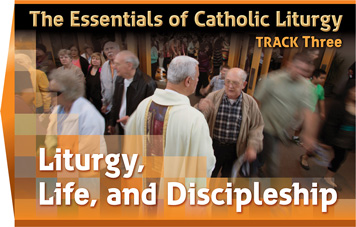
Track Three emphasizes the celebration of the Eucharist as the source and summit of Christian life. The topics in this track are particularly appropriate for those with a solid understanding of the liturgy.
W1. Liturgy and the Modern World
“[T]he Church has always had the duty of scrutinizing the signs of the times and of interpreting them in the light of the Gospel” (Gaudium et spes, 4). In this introductory session, participants will explore the role of the Church’s liturgical celebrations in the context of the world we live in. What does the liturgy teach us about political, social, economic, racial, and ideological disputes? How are we to reconcile our abundant wealth, resources, and economic power with the powerlessness and impoverishment that so many people struggle to survive in?
W2. Liturgy and Mission: Evangelization
Christ commissioned his followers to go into the whole world and make disciples. Nourished by the Word and the Eucharist, we are sent forth from every Mass to carry out that mission. Yet, while our mission is clear, it is not always easy to fulfill. The realities of work, family, and everyday life can often distract us from the missionary aspect of our faith. Go and Make Disciples, a document by the bishops of the United States, reminds us that we need to equip our parishioners to fulfill their duty of “bringing the Good News of Jesus into every human situation.”
W3. Liturgical Catechesis and Mystagogy
The Eucharistic liturgy is inherently catechetical. Mystagogical catechesis leads the faithful to a deeper understanding of and communion with the Paschal Mystery. It teaches us how to live as Christians in this world, and it forms us to live in a constant state of mission. Participants in this session will reflect on the actions, words, and songs of the Mass, inviting us to explore the familiar saying: lex orandi, lex credendi, lex vivendi, “as we worship, so we believe, so we live.”
W4. Liturgy and Social Justice
We pray at every Mass for the poor and the marginalized, for peace and justice, and then are sent forth from the Lord’s Table to glorify the Lord with our lives. How? By living as we have prayed. We celebrate the liturgy not just for ourselves, but for the world. How does the liturgy call us to full, conscious, and active participation in the life of the world?
W5. Liturgy and the Art of Celebrating
The ars celebrandi, “the art of proper celebration,” is “the primary way to foster the participation of the People of God in the sacred rite” (Sacramentum caritatis, 38). Celebrating the liturgy properly is a skill and an art. It seeks to allow Christ to be the artist, the one who is active in the Eucharist, so that our participation becomes a sharing in his actions, his prayer, and in his offering. Directions and instructions for how Christians are to celebrate the Eucharist abound throughout Christian history, including the current edition of the General Instruction of the Roman Missal. What do the ministers who prepare liturgies of all kinds need to know for proper, artful celebration?
W6. Liturgical Spirituality
The foundation of liturgical spirituality is the Paschal Mystery of Jesus Christ. Throughout The Essentials of Catholic Liturgy, the life, death, Resurrection, and Ascension of Christ has been at the root of our exploration of the Church’s liturgy. The Church’s prayers, seasons, and rites invite us into deeper communion with Christ, forming us into his Mystical Body. In this session, participants will examine how the liturgy not only shapes the interior life, but also affects how we proclaim the Good News in our daily living.
© 2026 Liturgy Training Publications. All Rights Reserved. Contact Us Terms and Conditions